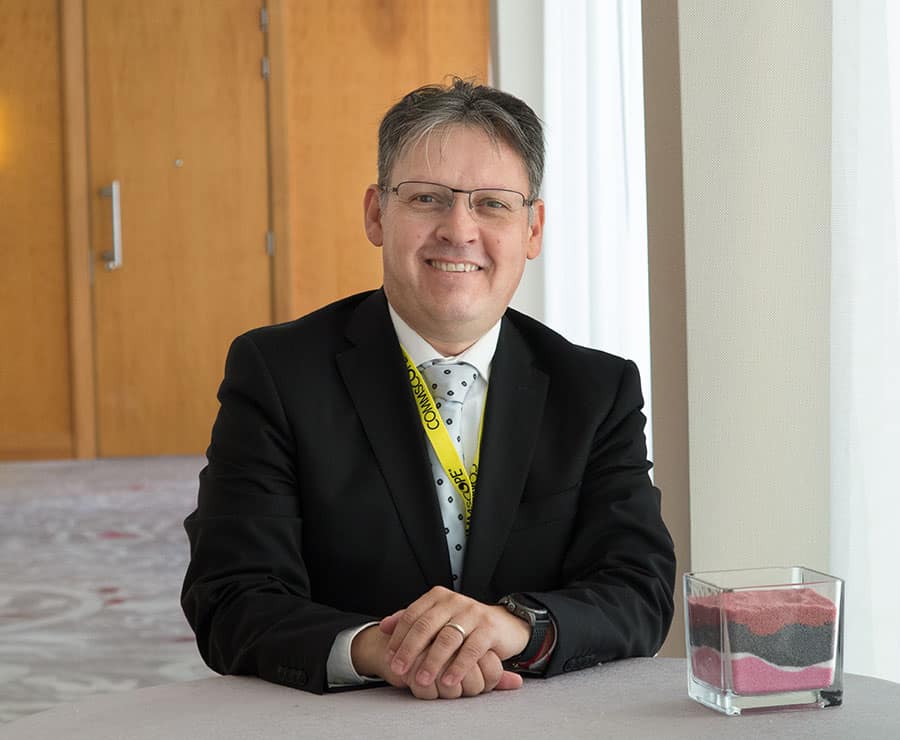
Above: Luis Guillot, CTO, Government Solutions for Huawei, LatAm. Photo by Mark Lyndersay.
BitDepth#1207 for July 24, 2019
There is general agreement within the region that digital transformation is not only desirable; it’s both necessary and overdue.
In his feature address at the launch of CANTO’s 2019 conference at the Hyatt Regency on Sunday, Minister of Public Utilities cited forward looking quotes by Grenada PM Keith Mitchell and Dr Warren Smith, president of the Caribbean Development Bank before adding his own solemn warning.
“A CARICOM Single ICT space is an essential element of that regional marketplace,” Le Hunte said, “it allows our citizens within this space, to operate and transact business with a greater degree of ease and comfort, while ensuring their safety and respecting the sovereignty of our neighbours.”
For all the enthusiasm of that statement, the Public Utilities Minister had to acknowledge that the deadline for implementing the project had been pushed back from 2019 to 2022.
Luis Guillot of Huawei delivered a keynote talk on Tuesday morning before ICT focused Ministers from Montserrat, Guyana and Antigua and Barbuda discussed ministerly things.
“A CARICOM Single ICT space is an essential element of that regional marketplace, it allows our citizens within this space, to operate and transact business with a greater degree of ease and comfort.”
Robert Le Hunte
Huawei has delivered infrastructure and systems for Smart Cities technology in 700 cities in 100 countries and regions.
These projects always need infrastructure and a commitment to more open flows of governance data, but they always begin with a national plan.
“There needs to be a vision defined and then a start on taking steps in that direction,” Guillot explained in a conversation after his speech.
He was impressed with the National ICT Plan, which he views as an important first step in making a commitment to governance based on data.
“Last year that document appeared,” Guillot said.
“I haven’t seen that kind of document and vision in very many other countries in the region.”
At the CANTO’s opening ceremony last Sunday, Allen Chen, Huawei’s VP for Public Affairs and Communications for the Caribbean noted the successful deployment of Smart City solutions in Panama and Suriname and noted a new project to deliver digital improvement to services in Guyana in health, education, security and government administration.
Huawei is working on a major infrastructure upgrade and data convergence project in Guyana with a view to making the project a model for governments interested in moving to ICT-driven governance.
The Guyana project implements public safety systems, significantly enhancing communication capabilities for officers working in the field and installing public video surveillance.
“To do that we had to build the network,” Guillot said. “If you cannot transmit the information, you cannot create a convergence point for analysis and action.”
The Guyana contract also includes the construction of a distributed, redundant cloud system for collating and analysing government information.
“Before you begin, there needs to be a smart city agenda and initiatives, it can’t just be WiFi in the park.”
Guillot, who is Mexican by birth, explained that Mexico has the National Plan, which is served by the National Transformation plan, which articulates how ICT will drive the master plan for the nation.
“Most of the countries in the region talk about it, but once you put it in the print, it’s a different thing. It’s the word.”
When it comes to Huawei projects, Guillot has a soft spot for the tiny canton of Tibás in Costa Rica.
The Mayor there had little money in a small city of just 60,000 people, but he wanted to improve security. So he cut a deal with Huawei to rent selected smart city services, and going from five cameras to fifty.
“It is a small solution implementation, but it’s had a big impact,” Guillot said. “When people see the pole, they say hey, hey, the smart city has arrived in our town!”
“Cameras in the streets will help you lower the crime rate…for a while. You put a camera, and people will behave, but then you must have the action that puts meaning into the installation.”
“Five years ago, it was a lot of cameras and a lot of people watching the cameras, one person looking at 32 video feeds. That’s really watching nothing.”
“Technology has brought intelligence and analytics. Now you don’t have to watch grass grow. A computer doesn’t get bored, it analyses the video and looks for aberrations to bring to the attention of an operator.”
“Now we are able to look for very specific things, like someone wearing a red hat with a blue jacket. It’s not a red car, now we can look for instances of a red Corolla.”

